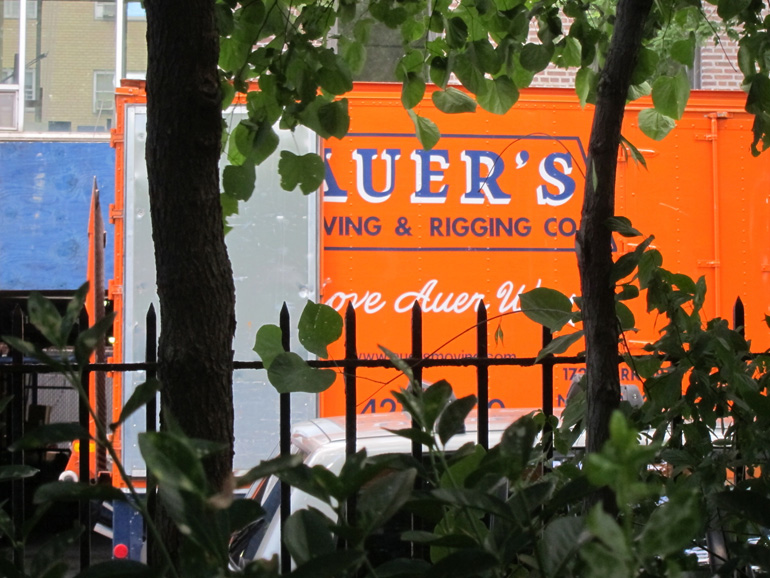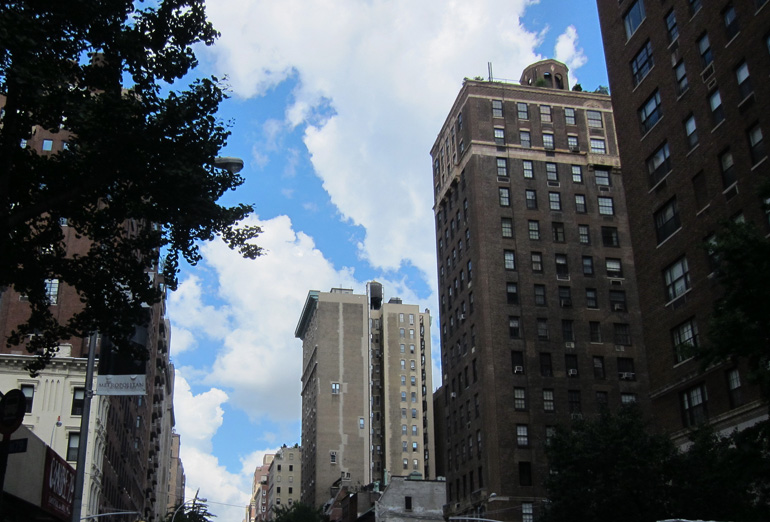Gotham Diary:
Auer’s
28 June 2012
Thursday, June 28th, 2012
Taking a walk after lunch the other day, I was arrested by a forgotten but instantly familiar sight: a truck painted orange and emblazoned with the Auer’s logo. Not surprisingly, the truck was parked along Gracie Square (the last block of East 84th Street, between East End Avenue and the East River); the firm speicalizes in upscale moving.
Two houses down Hathaway Road from our first house in Bronxville (Eastchester really), in a much prettier little house (Nº 23, if you want to stroll along in street view; we were at 29), lived the Auers, Mr and Mrs, an elderly couple. I would guess that Mr Auer was the founder, or co-founder, of what is still the family business; by 1955, when we moved to Hathaway Road, he was retired, and the moving company was run by his son — I am also surmising. I so surmise because of the occasional appearance of the Auers’ grandson, known as GJ. I suppose GJ came to spend the odd week with his grandparents, perhaps because his parents still lived in the city — probably not far from where I’ve been living all this time. GJ was a bit older than I was, and taller and leaner, as I remember, and very lively; and I remember getting into trouble for doing something with him. I was about eight years old at the time, and the world of forbidden things was immense, but doing anything at all with GJ would probably have been enough. The Auers were “from the city.” This was not a class problem but a “ways” problem. Our ways were not their ways.
My mother’s fear and loathing of New York was one of the differences between us that I never understood while she was alive. That’s to say that I didn’t see it. When she complained about the city, I imagined that, if whatever she was complaining about were fixed, then she would stop complaining and start enjoying the place, because how could you not? She could not. Her childhood was spent in Wilmette, a suburb of Chicago comparable to Bronxville in many superficial ways, but ultimately quite incomparable because of the difference, not really measurable to my mind, between Chicago and New York. You hear a lot of talk about New York versus LA (or you used to do), but LA is just another Long Island sprawl populated by thinning ranks of overlooked locals by the vacationers from New York. New York and Chicago are the American antitheses, or would be, if New York were really American. Chicago is really American.
My mother eventually found happiness in Houston. Even then, I didn’t see her fear and loathing of New York for what it was. I was confused by her readiness to jump on one of the company planes at the drop of a hat for a jaunt to the Big Apple. I didn’t understand that she liked going because what she liked even better was coming back, and coming back loaded with goodies. Kron’s chocolate — that was a big deal for a while. Tortellini were another. My mother had a dish of them at Barbetta (natch) and “found out” where to buy them “wholesale.” I wasn’t paying a lot of attention by this time, so I can’t say from memory how many dozens of boxes she flew down to Houston, but I’m sure that the number was exaggerated.
My mother loved visiting New York. But she hated living anywhere near it.
***
My father, I think, was indifferent to New York. It didn’t bother him. He was where he was. Until he felt that his game was falling apart, he liked best being on a golf course. I didn’t understand this, either, but that’s another matter. My father’s fears and loathings remained unknown to me. He seemed naturally confident always — a fine Midwestern bluff. There was one exception, in the last years at the Hathaway Road house, when as part of his job he began to have to address the security analysts on an annual basis. Did what I just say mean anything to you? It sounds Egyptian even to me. Security analysts? Who were they? How to describe them in today’s terms? I must ask Fossil Darling. In any case, I expect that my father was addressing the New York Society of Security Analysts (they seem to be CFAs now). Not a natural public speaker, at least in his own mind, my father rehearsed his speeches by delivering them into a microphone attached to a cassette recorder (new at the time, and “cheap.”) He stood at the tall dresser in his bedroom and pretended that it was a lectern.
My memory of these rehearsals is corrupt and contradictory. Did I ever try to listen to one of the speeches all the way through? If I did, I wasn’t allowed to do it again — or would I have wanted to? I had no idea what my father was talking about, except that in some extremely obscure way he was making a sales pitch. He was touting the stock of the company for which he worked — but of course I wouldn’t have known to put it that way then. But it was the one time that I actually watched my father work. So this was what he did! Well, it was something. Everything else that he did was done in an office in the city, to which he was not unhappy about commuting every day, invisible and impalpable.
(He was very fond of telling a story about his father-in-law, who, after the War, decided to cut down on commuting time and get to work earlier by moving into the city. He took at an apartment in Sutton Place shortly before I was adopted. After two years or so, he gave it up and moved back to Bronxville. It turned out that he was spending the commuting time by sleeping late and lounging over breakfast. I don’t think that he cared for the city much, either. I think that my father liked this story because it cautioned him against suggesting anything of the same to my mother.)
I remember asking my father what a sinking fund was. It wasn’t what I wanted it to be, and it still isn’t.  Â



